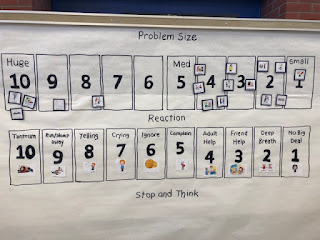My rollercoaster of emotions!
Everyone experiences different emotions throughout a day. This week we talked about the importance of being aware of our emotions and gaining control of them so we can learn and live a healthy life! Classes reviewed "The Zones of Regulation" by discussing what emotions we feel in each zone. We used the following videos to help us identify the emotion(s) the character was feeling and what zone(s) they were in. Crabby Girl: Red zone My Valentine: Blue zone/yellow zone Elf: Dancing on the table Yellow zone We also discussed how our emotions can affect others around us in a positive and negative way (good thoughts about us or uncomfortable thoughts about us). ex. If I am in the red zone and I start screaming and yelling at a friend, others might start to get a negative feeling or uncomfortable thoughts about me. After reviewing important social/emotional terms ( Zones of Regulation, self-regulation, self-regulation tools, emotions, expect
